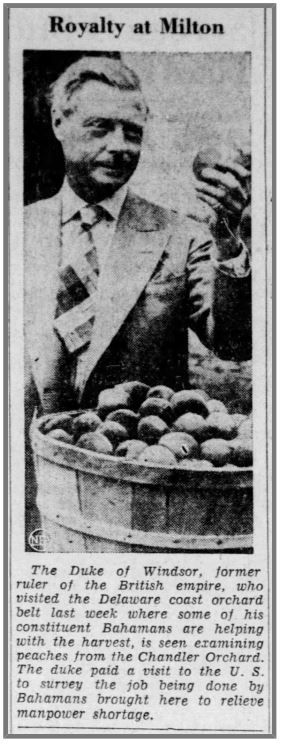
The date was August 8, 1944, and the climactic campaigns of World War II were being fought in Europe and Asia by the Allies against the Axis powers. 16 million American men and women were serving in the U. S. Armed Forces, out of a total population of 138 million. Of those on active duty, 73% were serving overseas. Most books and films about that time focus on the hardships and horrors endured by our military personnel, the steady progression of their victories, and their ultimate triumph. No less important to waging total war is what Americans were doing on the home front. “Rosie the Riveter” is emblematic of the great number of women who took the place of men in armaments factories, shipyards, and other non-traditional occupations, to keep the United States’ massive industrial engine operating at full throttle.
Somewhat less known is what was transpiring in the agricultural sector in general, and Delaware in particular. Farming was regarded as a critical industry, and deferments from conscription were granted to military-age men who lived and worked on a farm which met certain requirements as to acreage and number of “animal units” raised. However, these deferments were not enough to prevent a critical shortage of farm hands by the spring of 1943.
A variety of measures were undertaken in different sections of the country to obtain agricultural manpower. In the Sussex County, Delaware, one of these measures was the importing of hundreds of laborers from the Bahamas, then under British rule. These men supplied labor for many farms in the county, and resided in a camp set up for them on the Lewes-Georgetown Highway.
Since 1941, the Governor General of the Bahamas was none other than the former King Edward VII of the United Kingdom. Abdicating the British throne in 1936 so he could marry American divorcee Wallis Simpson in 1937, he was given the newly created title of Duke of Windsor that year. He and his wife toured Germany in 1937, and when World War II began he was assigned to the British Military Mission to France. Privately accused of being a Nazi sympathizer, he was removed from that post and sent to the Bahamas to assume the governor’s title in 1941.
In 1944, the Duke of Windsor undertook a brief tour of the Sussex County camp where Bahamian laborers were living, ostensibly to evaluate their productivity but mostly as a public relations opportunity. He did not disappoint the photographers and reporters who followed his every footstep. On August 9, 1944, the Wilmington Morning News reported that the Duke climbed a ladder at the Chandler Orchard at the western edge of Milton to pick peaches. He also visited Beebe Hospital, where a 16-year old British boy was being treated for a broken back.
In my next post, I will provide an in-depth look at the history of the Chandler Orchard.

Very interesting Phil, didn’t know any of that info.
I stumbled across the article in the course of researching the orchard. Quite a character, your Duke..
[…] The Chandler Orchard in Milton had a celebrity visitor in 1944 – the Duke of Windsor, who abdicated the British throne so he could marry American divorcee Wallis Simpson. For more information and a newspaper clipping, please visit my previous post. […]